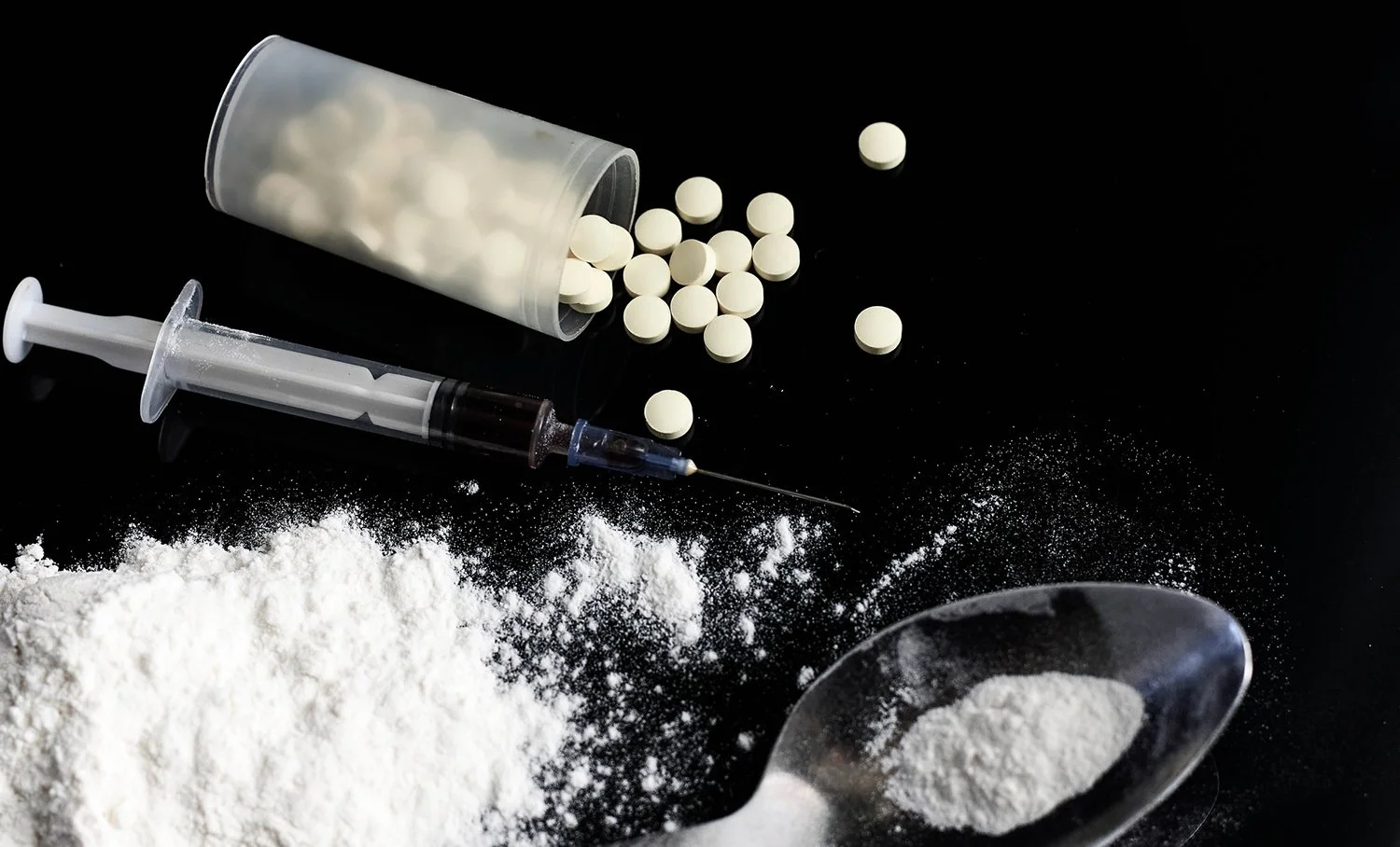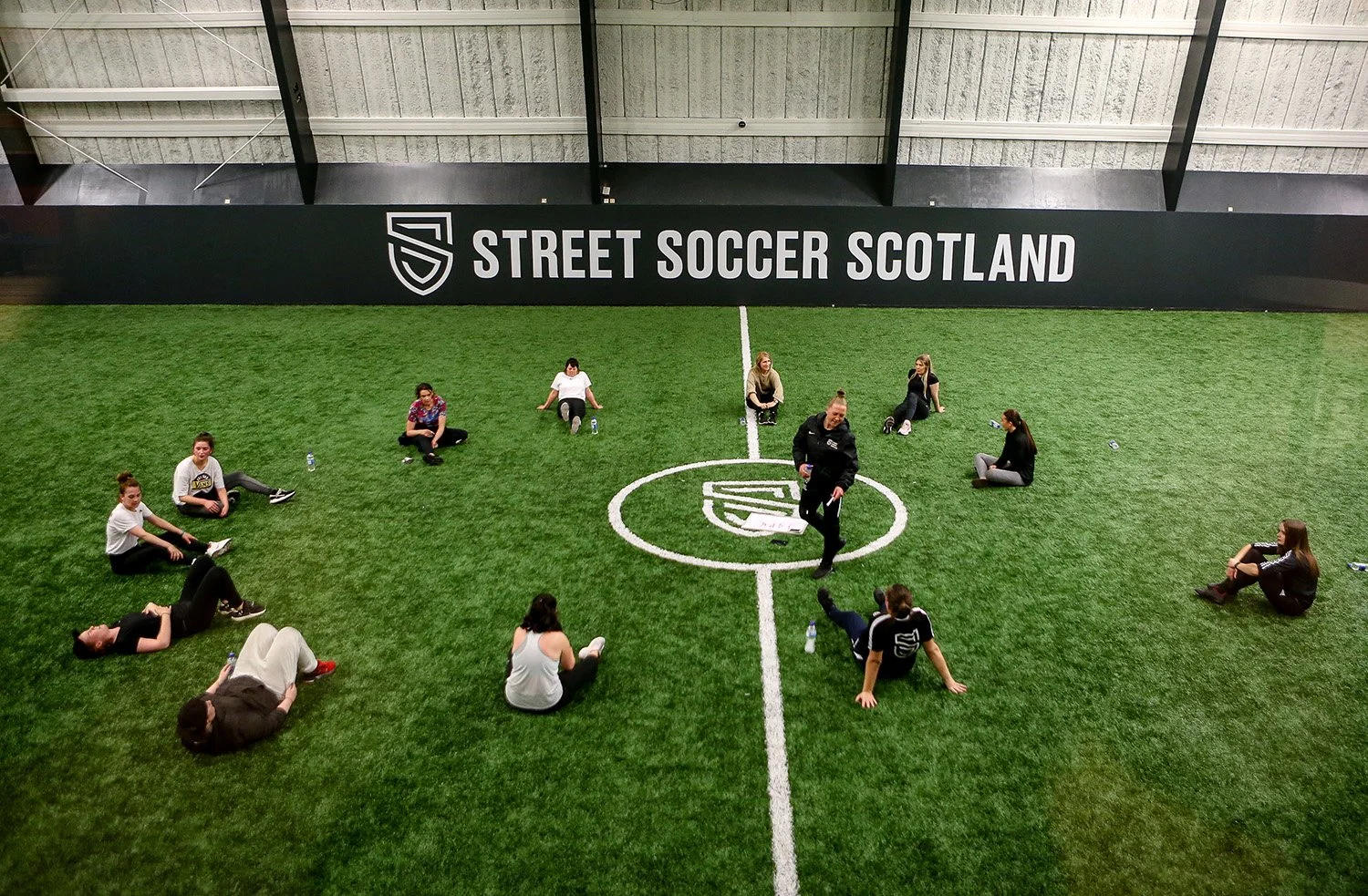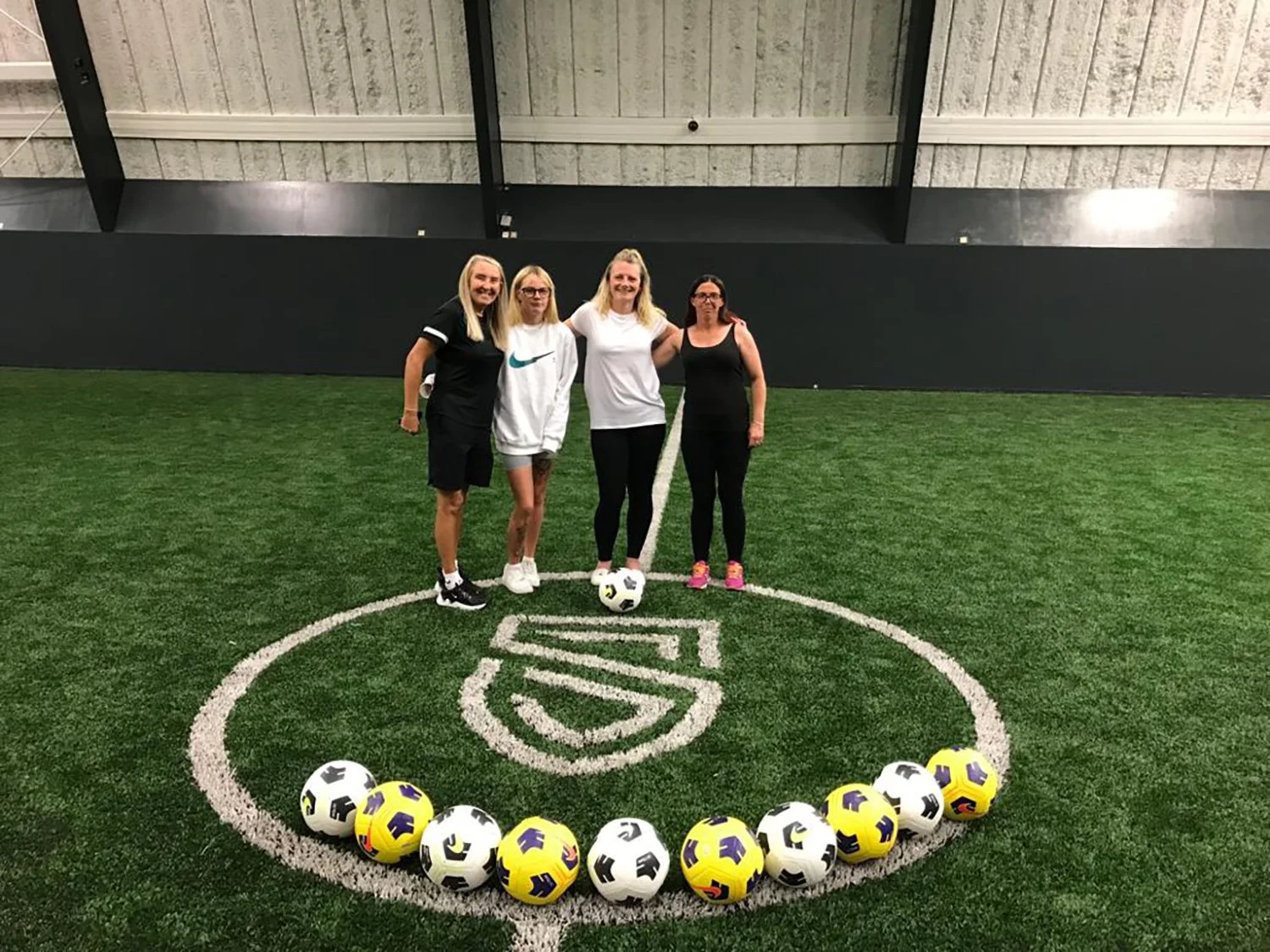“I’m not Louise the ex-heroin addict, I’m not Louise the addict, I’m just Louise.”
|Image: Gareth Jennings/DCT Media
When we visited our partner Street Soccer Scotland’s new Change Centre in Dundee, I met Louise Fairweather briefly as she was running off to work. She’d finished her volunteer shift and was on her way to her job as a peer mentor for the women’s mentoring scheme with organisation, ‘Tayside Council on Alcohol’.
We caught up a couple of days later in between her home visits. She told me about her ten-year heroin addiction, her love of football and how she’s using her life experience to help others. Louise has been drug-free since 2015.
“I’m tackling this stigma that once an addict, always an addict. I’m living proof that’s not true.”
Growing up in Forfar in Angus, Louise always loved football. Being the only girl in the local cul-de-sac didn’t put her off, and the boys quickly invited her to play in their team. A talented player she was scouted to play for Angus and then to play for the Scottish youth team.
“Sadly, that’s when the drugs and going out with my friends at the weekend was more important. It was the usual, saying to my parents: ‘I’m staying at my friends’.”
“I had the loving support of my family, it was drummed into me, drugs were a big ‘no-no’. But unfortunately, I just went down that path like my peers. It was like it was accepted back then when I started doing it. It was like a weekend thing.”
At 14, Louise was taking ecstasy at the weekend, by 15 she was taking it in clubs and at parties. On Sundays, she would smoke cannabis as she came down off the high from the night before.
“IT WASN’T CANNABIS, IT WAS HEROIN”
When her older boyfriend one day suggested she tried ‘this other cannabis’, she went along with it. But it wasn’t cannabis, it was heroin.
“Heroin addict – it can’t be a weekend thing. Before you know it, you’re addicted.
“I just started to lose everything, my job, my house, my car, my money. Everything started to go and before I knew it, I was stuck in this addiction. And it only took a matter of about four weeks, and I was clutched.
“I always remember heroin got called the devil’s dust, it’s like fairy dust but it’s evil. That little bit of powder, you would do anything for that little bit of powder.
|“Heroin got called the devil’s dust, it’s like fairy dust but it’s evil.” Image: Marco Verch
“You don’t know how quickly it takes a hold of you until you’ve got no money and you’ve got none of the drugs and the pain is that bad. I was too ashamed to ask for support.
“I had to leave the family home. I struggled to keep my own tenancy sometimes, it was more the loneliness. I was sofa surfing and some of the houses you put yourself in were a big danger, but I’m lucky that I still had the support of my family. They just couldn’t live with the lifestyle.
“My mum and dad they’re like best friends to me. We’ve always had that close bond. I still remember the day I walked in with a bag of heroin in my hand and started shouting, ‘I need to put it down the sink, I’ve had enough’. I was withdrawing, and I was on the way to take it, and something just clicked that I can’t do this and the first place I went to was mum and dad’s.”
She stopped taking heroin, but she had a wakeup call four years later when she was found in possession of Valium (also known as diazepam) by police during a raid on a house where drugs were being sold.
Louise’s dad had been diagnosed with a brain tumour and shortly after her mum had a heart attack: “I know how to numb this pain. I knew I would never take heroin again. It was Valium I’d taken.
“I had been out of that lifestyle for four years, I’d made that one-day decision, I was about to get put to jail.”
A TURNING POINT
Instead of being sentenced to custodial time, she was given a diversion order. For Louise, this was a turning point.
A diversion order is when someone is redirected from prosecution, the court instead referring them to social work, a treatment programme and/or supporting agencies.
Through her court order, Louise was introduced to her mentor, Sarah Healy, who worked for ‘Tayside Council on Alcohol’ in the Angus office.
Louise told her about her love of football when she was younger, and Sarah suggested she go along to Street Soccer Scotland. Fast forward to 2022 and Sarah is now her colleague, they both work in the Dundee office and Louise is bringing her mentees along to sessions with Street Soccer Scotland.
|Street Soccer Scotland run weekly drop-in sessions for women. Photo: Street Soccer Scotland
“When she said she’d walk along beside me, she’s still here to this day.
“It’s a shame to think that if I wasn’t getting put on that diversion order, I was going to jail. I’m so glad that option was there. That isn’t that common, and I think that alone would clear up a lot of spaces in our jails.
“A lot of people will go out and nick a packet of ham just to get put back in the jail because they get support.”
Support from her mentor and the team at Street Soccer Scotland has been vital to Louise’s recovery. Playing football and building her fitness helped her gain confidence.
FEELING ACCEPTED BY SOCIETY AGAIN
“When I have a football at my feet, I forget everything, it’s always been like that with me.
Louise’s love of football led her mentor Sarah to suggest she go along to Street Soccer Scotland.
“Fitting back into society was probably one of the worst things. Because you wonder where do I fit in? I was a drug-addict so should I still behave like one even though I’m not doing it? Even being told that Louise is enough. I’m not Louise the ex-heroin addict, I’m not Louise the addict, I’m just Louise.”
When Louise stopped taking drugs, she struggled to understand why her parents were proud of her. She felt that she’d done something wrong so there was nothing to be proud of by “fixing” what she’d done.
The continued professional and family support helped her realise that beating her addiction was an achievement and allowed her to overcome her shame and embarrassment.
“You feel more accepted to go back into that society and you’re not as embarrassed, so just knowing that you’re accepted there, makes you think ‘I can be accepted in another place.’
“We hear it a lot, ‘let’s tackle the stigma’, but at The Change Centre you’re seeing it in action.
“They saved my life, the guys have a special place in my heart, I could never repay them.”
A TRAGIC REALISATION
Out of the group of people she associated with during her addiction, she is the only one who has overcome it.
“I was the only one out of a massive heap of us addicted that has been able to do it. I have more associated friends in the graveyard than I do in the streets now. So, when I’m going up to the graveyard now it takes quite a while because you’re going to see everyone.”
Realising what she’d just said she started to cry. “I’d never thought of it like that, it’s sad, isn’t it?”
More than 120 people died of drug misuse in Dundee in 2019 and 2020. Image: Neil Howard
Louise has seen first-hand the reality of the rising number of drug deaths in Scotland. According to Scottish Government figures 1,339 people died of drug misuse in Scotland in 2019. Of those, 72 people died in Dundee in 2019, while 57 died in 2020.
HELPING WOMEN OUT OF ADDICTION
|“Knowing, yes, I can help here. It’s the best feeling in the world.” Photo: Street Soccer Scotland
Now she’s part of the change helping to support women who are struggling with addiction and mental health. Louise describes it as her ‘new addiction.’
“If I can save one addicted person and help them think ‘if she can do it, I can do it, it can be done.’ Then I’ll shout it from the rooftops for the rest of my life.
“Knowing, yes, I can help here. It’s the best feeling in the world.”
Find out more about Street Soccer Scotland’s work and how they’re using football to end homelessness and tackle social isolation.
Words: Rebecca Corbett





